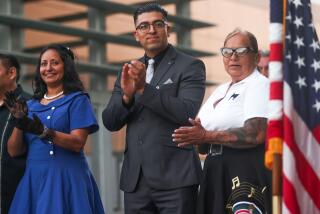Fiery Council President Leads Pack for Mayoral Primary in Cleveland
- Share via
CLEVELAND — It’s been a while since George Forbes has thrown a chair at anyone. He doesn’t curse much in public anymore, either. And the volatile City Council president has put an apparent moratorium on manhandling reporters.
George Forbes is running for mayor.
The controversial Forbes, whose explosive temper is almost as legendary here as his daunting political power, is cleaning up his act. He is seeking to legitimize what nearly everyone concedes has been his longstanding role as “the man who runs City Hall.” In doing so, however, he is taking a risk.
The wealthy black attorney is the acknowledged front-runner in today’s nonpartisan primary, in which he faces four other candidates.
But despite Cleveland’s status in the 1960s as one of the first major cities to elect a black mayor, and despite a population that is almost evenly divided between blacks and whites, there has not been a serious black mayoral candidate here in years.
Tough to Attract Whites
“Make no mistake about it,” said Gerald Austin, a Forbes campaign consultant. “Cleveland is racially divided.” Winning white voters will be Forbes’ toughest task.
The two top vote-getters will face each other in the November general election. Until recently, the primary almost seemed like two distinct playoffs, with black East Siders choosing a champion who would face a white West Sider in the general election.
But black state Sen. Michael R. White, who was endorsed by the Cleveland Plain Dealer as “easily the standout mayoral candidate,” has been gaining on Forbes. A poll in Sunday’s Plain Dealer showed Forbes leading with 23% and White in second place with 16%.
White calls the city a “racial powder keg.” Whenever Forbes has accused an opponent or the news media of racism, White has been quick to denounce him for using race as a tactic.
The white front-runner has been Benny Bonanno, the 39-year-old Municipal Court clerk who has held five elected offices, including state representative and city councilman. He has been accused by opponents of caring more about winning elections than serving in office, but he has a solid base of white ethnic voters who respond passionately to his stands against busing and for neighborhood development.
He also has made inroads into the black community by winning the allegiance of several influential blacks.
His chief opponent for white votes is Cuyahoga County Commissioner Timothy F. Hagan, a friend of the Kennedy clan who, despite the lack of a broad voter base in the city, has waged an aggressive media campaign. His television commercials have sought to keep the spotlight on two major scandals that involved Bonanno and Forbes.
One commercial rips into Forbes for his unwavering support of a controversial police operation that allowed a white drug dealer to sell half a million dollars’ worth of uncut cocaine in the black community. The money was then allowed to vanish into the Miami drug pipeline.
Although this all was done to set up a sting that eventually netted 46 kilograms of cocaine, the operation drew harsh criticism from a number of black officials and is being investigated by the Justice Department. Forbes, however, said the police should be given medals of honor.
Another Hagan commercial criticizes Bonanno for writing a letter of recommendation in 1983 urging an early prison release for a mobster who had previously done time for killing two Cleveland policemen.
The third white candidate, School Board President Ralph J. Perk Jr., is the son of a former mayor and was a late entry into the race.
Clevelanders have spent the last relatively calm and prosperous 10 years under Republican Mayor George Voinovich, who is now running for governor, trying to forget the disappointments and embarrassments that have beset the city since the 1960s. There was the day in 1969 that the oil-smeared Cayahoga River, which runs through downtown, caught fire.
And then there were the mayors who Fortune magazine said “seemed to have stepped out of a Three Stooges movie.”
Ralph Perk Sr., mayor from 1971 to 1977, is remembered mostly for his fiscal policies that set the city on the road to bankruptcy and for setting his hair on fire while trying to cut a metal ribbon at a bridge opening with an acetylene torch. He was succeeded by the pugnacious Dennis Kucinich, the populist “boy mayor” who battled mightily against big business interests while the city drifted inexorably into default.
Some of Forbes’ opposition stems from worry that his frequent outbursts might also embarrass the city if he is elected mayor.
The 58-year-old Forbes has been council president for 16 years and has sat on the council for 26 years. Because of his domineering personality, his control of the city’s purse strings as chairman of the council’s Finance Committee and a succession of retiring or ineffectual mayors, Forbes emerged in the 1970s as the city’s most powerful politician.
“If people in Cleveland, especially whites, can put aside their racial prejudices and put aside the fact that (Forbes’) personality irritates them--which may be a big thing to ask--they’ve got to acknowledge that he’s the most experienced candidate,” said Austin, the Forbes campaign consultant.
But Forbes’ critics say he has used his office to increase his personal wealth and has sold out his constituency in favor of downtown business interests. As a result, they say, downtown is undergoing a renaissance while the neighborhoods continue to suffer. They also accuse him of using his control of government grants to win the allegiance of community groups and black churches, in effect co-opting black leaders who otherwise might oppose him.
More to Read
Get the L.A. Times Politics newsletter
Deeply reported insights into legislation, politics and policy from Sacramento, Washington and beyond. In your inbox twice per week.
You may occasionally receive promotional content from the Los Angeles Times.










